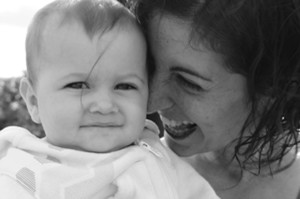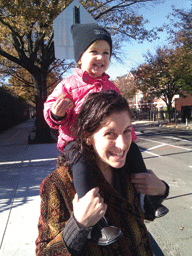
From the time she was born, my daughter Sonya has watched me kiss our mezuzah one, two, sometimes fifty times as I walk through our apartment door. I kiss that prayer scroll before I kiss her, most often before I even say hello. She also knows that Mama prays once a day, which means I go into our basement with a candle, and no one disturbs me for thirty minutes.
“Why Mama pray?” my four-year-old Sonya asked last week.
“Because she has to. Because she wants to. Because — I’ll be back in a little bit.”
I’ve been in treatment for severe obsessive-compulsive disorder for most of my life. I’ve cut myself, starved myself, and scrubbed my hands raw. Daily prayer is the one healthy practice I’ve kept the longest, and it’s grounded me when I feel most unmoored. It’s also been the hardest to explain.
I had a mezuzah in the house where I grew up, but I never saw my parents kiss it. We belonged to a Reform Jewish synagogue and had chicken soup and challah for Shabbat every week. My mom taught my brother, sister, and me to say the Shema prayer before bed each night. It gave closure to each day and made my mom smile, and that was all I needed.
But soon one Shema wasn’t enough for me. When I was eleven years old, my aunt and father died in quick succession. I was sure I’d made them die, and I had to atone before I struck again. After Mom tucked me in, I added five, ten, twenty recitations of the Shema, a song of thanks, and a list of sick people I needed to heal. I remember nights when I woke up frantic and hot, furious that I’d fallen asleep despite more prayers to say, more kisses to blow to the heavens.
Did I do it right? Did I do it enough? Did I sound devoted? Did I please Him?
In high school I snuck into dark closets — not to kiss boys, but to chant Psalms. I went on medication briefly in college, but took myself off for fear it was blasphemous, and my mom would die next. When I moved in with Jay, who is now my husband, he watched me kiss my mezuzah urgently.
“I wish you felt like you had to kiss me 250 times when you walk through that door,” he said sadly.
My prayers got longer, my lists and songs multiplying. If Jay wanted me, he had to accept my beliefs without question.
Our daughter Sonya was born on October 5, 2008. As I lay with her slippery skin pressed to mine, I knew this would be the scariest day of my life. It was the first day in twenty-five years that I ever willingly skipped prayers. There was no place to cloister myself in a shared hospital room, much less with a seven-pound newborn mewing for milk. Sonya was someone I had to take care of with my hands, instead of with my pleas.
I looked through the hospital window and smiled shyly at the sky. I wanted Him to know I was so wildly grateful for this child that no words could suffice. I held Sonya tightly and babbled at her to fill the empty space of my fear. I could no longer try to control the universe from behind a closet door. I was a mother with vital responsibilities.
Those first twenty-four hours were a terrifying relief. As it turns out, no one died because I skipped my prayers. But the bliss of those first coos and milky grins soon hardened. On the fourth day of Sonya’s life, I left her upstairs with Jay while I went down to our basement and sat on a pillow, sore and shaky. I wanted desperately to thank Him for this miracle, to pray with an honest, open heart. No mindless repetitions and rituals would suffice. I was too evolved, too in love with this new human to simply follow a pattern blindly.
Yet, motherhood could never be a remedy for a mental health disorder. Everything about being a new mom felt groundless and out of control. I left Sonya in Jay’s arms each morning so I could pray regularly, insistently.
My life outside the basement became a series of new, unwavering practices too. Repetition was supposed to be comforting for children, I reasoned. Every evening, I massaged Sonya’s toes and sang a series of lullabies. When I felt too exhausted and cut off a verse, the tug of fear closed in.
If I don’t sing to her, I’m unfit to be a mother. If I don’t beseech G-d, Sonya will disappear too. Cradling my daughter fiercely, I read the same book in the same cadence night after night for an entire year:

Goodnight comb, goodnight brush
Goodnight nobody, goodnight mush.
Somehow the soothing part got away from us. Sonya wasn’t following my lead. She fell asleep in the middle of a meal or refused to nap in her carrier. One night I tried to light the Shabbat candles with her, and she banged on her high chair howling until I blew them out. She had her own rhythm, her own needs, and they were completely out of sync with mine.
Each time she squirmed away during the massage, I pinned her down and started again, both of us whimpering. I coped in the only way I knew how — by adding more ritual and repetition. Sonya followed my lead, running headlong into the spiral I know too well.
Our bedtime routine turned into a one-act drama: kisses on her toes and lotion on her belly. A review of her day and an outline of how her sleep would unfold with fairy-tale dreams. After two books and a cup of water, turn out the light and tell a story. Walk to the crib, press play on her lullaby CD, then one kiss for Waldorf (her toy duck), one kiss for Pepto (her toy pig), and one kiss for Sonya.
We added a kiss for each palm, in case she got up during the night and needed another. Then there was the butterfly kiss and the kiss through the bars of her crib. Finally, there was the kiss called Last Kiss. We said (in unison) as we leaned in to touch lips, “I love you I love you I love you I love you I love you.” Five times. A tight, fast hug. Then I would close the door to the sound of her wails.
Sometimes I didn’t even make it out of her room before she started crying. I pulled away from our goodnight hug just in time for her to yell into my face, “Lastkisslastkisslastone!”
With her tiny shoulders hunched and her lips pinched, she panted as if being hunted by wildebeests. I explained firmly, “We just did a last kiss and a last hug. Three of them, actually.”
“Last ooooone!” she moaned.
“Last one,” I repeated.
I leaned down to give her one more. But she still screamed as I left.
Some nights I went up there three or four more times, trying to slay both our demons. Other nights I sat at our kitchen counter and came up with all the fatal illnesses she could have.
Hours after I’d been up, I heard her whimper drowsily, “Lastkisslastonelast …”
The crucial task left unfinished.
I worked with my doctor, tried new medications and breathing exercises. I started with a cognitive behavioral specialist and added exposure to my therapeutic tools. As always with obsessive-compulsive disorder, it took lots of lurches and stumbles to get to more stable ground. I knew I was working not only for myself, but for my child too.
There did come a day — not too long ago — when I was able to tuck my daughter into bed, read her two books, sing her a lullaby, and simply walk toward the door.
“Wait!” Sonya yelped. “Last —!”
“If you say last kiss, it has to mean last kiss,” I said calmly. “Otherwise it’s just words.”
“But that kiss wasn’t a good one it was —”
“Stop.”
I cut us both off. We waited in the dark, hearing each other pant. Then I landed a question: “What do you think happens after last kiss?”
This was the open-ended unknown she had witnessed in me every day. The tension and also the hope.
Sonya thought for a moment, and then said, “Mama go to sleep and have cup of tea.”
“Exactly,” I told her proudly. Chronology was unimportant. It was her trust that meant everything. We were both here for each other, the world would keep spinning, and it was safe to close our eyes.
Abby Sher is the author of Amen, Amen, Amen: Memoir of a Girl Who Couldn’t Stop Praying (Among Other Things). Twitter: @abbysher Site: abbysher.com
- Follow us on Twitter: @inthefray
- Comment on stories or like us on Facebook
- Subscribe to our free email newsletter
- Send us your writing, photography, or artwork
- Republish our Creative Commons-licensed content

